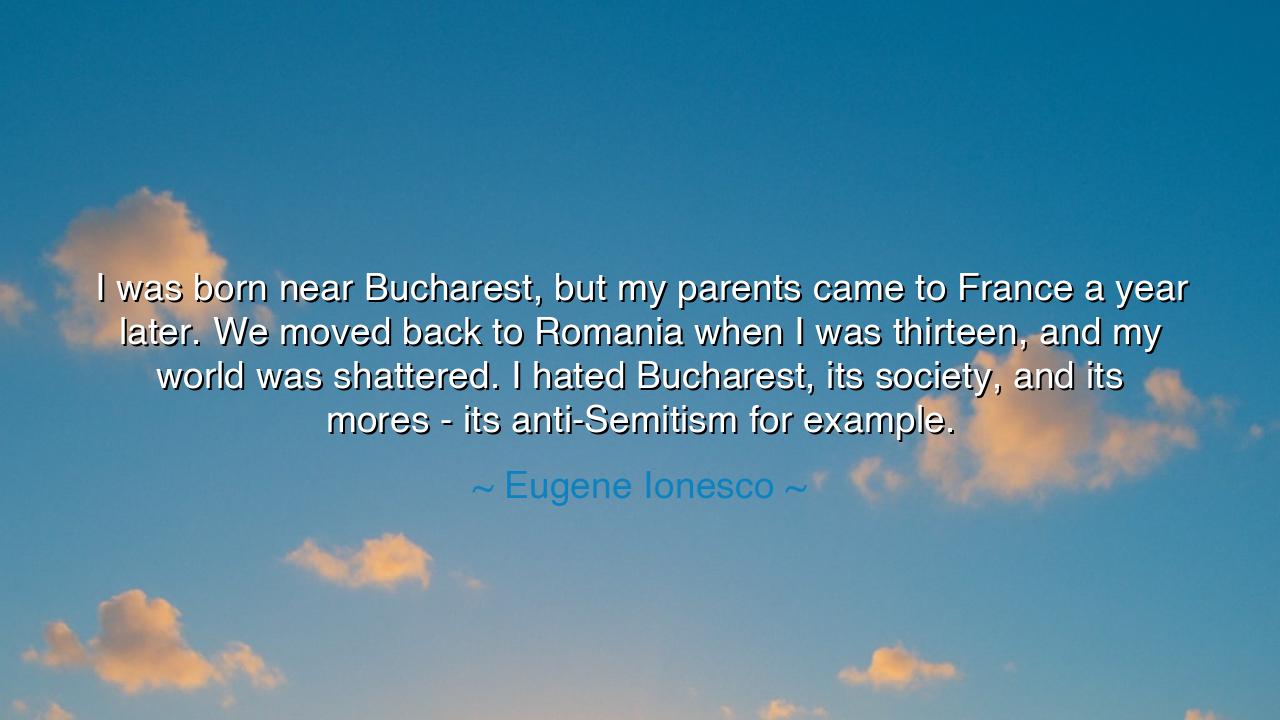
I was born near Bucharest, but my parents came to France a year
I was born near Bucharest, but my parents came to France a year later. We moved back to Romania when I was thirteen, and my world was shattered. I hated Bucharest, its society, and its mores - its anti-Semitism for example.






Hear the voice of Eugene Ionesco, the dramatist who bore within him the sorrow of exile and the anguish of division: “I was born near Bucharest, but my parents came to France a year later. We moved back to Romania when I was thirteen, and my world was shattered. I hated Bucharest, its society, and its mores—its anti-Semitism, for example.” These words are not merely recollection, but lamentation, the testimony of a soul torn between lands, cultures, and the cruelty of human prejudice. They carry the echo of a boy’s disillusionment, and of a man who sought through theater to strip away the masks of falsehood and reveal the grotesque truth of society.
In them, we hear the pain of the uprooted. A child raised in France, he tasted a world where freedom of thought seemed brighter, where culture sang with many voices. Yet upon returning to his birthplace, he met not the warmth of homecoming, but the cold iron of hatred, the poison of anti-Semitism, and the suffocating weight of customs that denied dignity. What he calls the shattering of his world was not merely the pain of change, but the recognition that a society may betray its own children, not by hunger alone, but by the venom of contempt.
The ancients knew this anguish well. Recall the tale of the Israelites in Egypt, strangers in a land that feared and enslaved them. Though they tilled its fields and built its cities, they were despised, marked as other, and cast into suffering. The plague was not only upon their bodies, but upon their souls, for to live in a society that denies your humanity is to walk daily in shadow. Yet out of this suffering came strength, the forging of a people who would not forget the meaning of freedom. So too, Ionesco’s wound became his fire: his plays stripped the illusions of polite society, exposing its hypocrisies with the sharp blade of absurdity.
In his hatred of Bucharest’s mores, we also glimpse a universal truth: that culture, when tainted by prejudice, becomes a cage instead of a sanctuary. Anti-Semitism, in particular, was the scourge of Europe, poisoning hearts and paving the road to horrors unimaginable. Ionesco’s rejection of this sickness was not only personal but prophetic. His art declared war on the unthinking, the cruel, the blind acceptance of norms that degrade others. To hate a society that hates is not bitterness—it is the cry of the soul for justice.
The wisdom here is that home is not merely the land where one is born, but the land where one’s dignity is honored. When a place strips you of humanity, it ceases to be home, no matter how deep your roots lie in its soil. Yet this rejection can also give birth to vision: the exile, the stranger, the outcast often sees more clearly the flaws of society, for he stands both within and without, with eyes sharpened by pain.
The lesson for us is profound: beware the mores of your own society. Ask whether they uplift or oppress, whether they honor or degrade. Do not accept traditions blindly, for not all that is old is wise, and not all that is familiar is just. Remember Ionesco’s shattered youth, and let it guide you to question what others take for granted. A healthy society is not one that clings to its habits unexamined, but one that purifies itself of hatred and opens itself to humanity.
Therefore, O listener, let your actions be these: wherever you dwell, stand against prejudice in all its forms. If your society demands cruelty, resist it. If your traditions conceal hatred, expose them. And if your land denies dignity to others, do not remain silent, for silence is the ally of oppression. Instead, become like Ionesco—transform your sorrow into creation, your disillusionment into vision, your brokenness into a light that unmasks the falsehoods of the world. For only then shall we build a world where no child’s soul is shattered by the cruelty of his own people.






AAdministratorAdministrator
Welcome, honored guests. Please leave a comment, we will respond soon